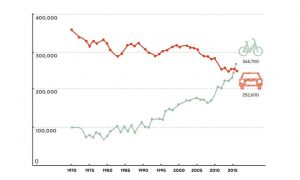Hereford council seems to be in a frenzy of road building mania. As with previous such frenzied periods of infrastructure investment there is an over estimate of future demand. Canal mania resulted in canals for which there never was an economic case, railway mania produced railways which were not really needed. Hereford has now built the Rotherwas Relief Road and the Link road, and is planning a Southern Link Road and a Western By-pass. There are those who also want to see a Northern Link Road and an Eastern By-pass, so completing their desired Hereford Orbital Road. All of this road building seems based on some very out of date assumptions about the economic advantages of road building and the future growth of traffic.
The Commission on Travel Demand has shown that people in the UK are now driving 10% fewer miles than in 2002, and spending 22 hours less travelling each year than a decade ago. There has been a 20% reduction in commuter trips per week since the 1990’s. The fall has been most rapid amongst young men, with 18 to 30 year olds now driving only half the distance their parents did at their age. After decades of growth the demand for road space has now levelled off. It could fall rapidly over the coming decades, and there would be many benefits to society if it did. We could combat a diverse range of problems from obesity to climate change, social isolation to air quality and asthma, while building a stronger local economy.
Hereford should cancel all road building. It would have been better had we not built the Rotherwas Relief Road and the new Link road. Here are some suggestions.
Make all local public transport within the county free. This is a growing movement in cities globally. Estonia has now extended this to the whole country, having successfully trialled it in Tallinn. Gradually replace all the counties buses with hydrogen fuel cell or battery electric, and our local railway lines would be strong candidates also to switch from diesel to hydrogen.
Build many more walking and cycling routes into Hereford, including bike superhighways. Make bus routes into the city much more frequent and reliable. Gradually and systematically reduce all car parking spaces within the city. By doing all these three things simultaneously and consistently over the last 45 years Copenhagen has successfully achieved a modal shift from cars to cycling, walking and public transport. In a small city like Hereford we could create this modal shift very much more quickly.
Safe walking and cycling routes to all schools should be created, while banning or at least massively restricting all car use close to schools during the start and finish of the school day. Slower speed limits, which might be variable and digitally displayed, so that a 20mph limit might the norm for residential roads but lowered to say 5mph in the vicinity of schools during the times children are arriving and departing.
As more and more people work from home the regular daily commute is becoming less the norm. Shopping too is changing, as more people shop online. In our family we do all our shopping by foot, with a shopping trolley for heavy stuff. Many new housing developments around the world are now being built with no or minimal car parking spaces, and where a condition of residency is not to own a car. Many people now find that they only need to use a car occasionally, say once or twice per week, per month, or even per year. For such people owning a car is unnecessary and a burden: much better to join a car share club. In Hereford we have a successful community run car sharing club that is open to new members. If you live in Hereford do contact us for more information. By next spring we hope and expect to be the first community car share club in the world to be using a hydrogen fuel cell car, in our case the groundbreaking Riversimple Rasa.
Hereford is an ideal size for walking and cycling. If more people felt safe to travel in this way the problem of traffic congestion would rapidly diminish, without the expense and damage caused by road building.

